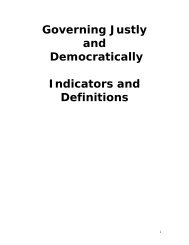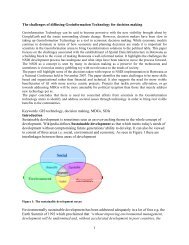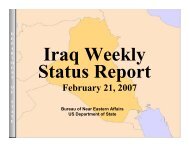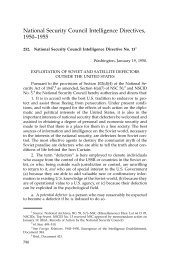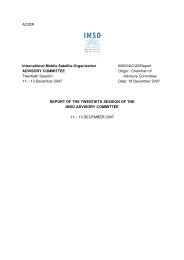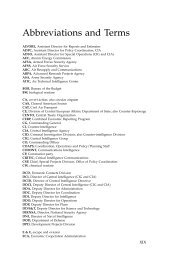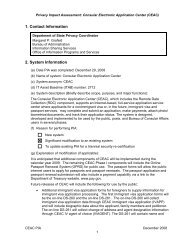Greece - US Department of State
Greece - US Department of State
Greece - US Department of State
Create successful ePaper yourself
Turn your PDF publications into a flip-book with our unique Google optimized e-Paper software.
698 Foreign Relations, 1969–1976, Volume XXIX<br />
the <strong>US</strong>G stopped the delivery <strong>of</strong> certain “high visibility” military equipment<br />
items to <strong>Greece</strong> following the April 1967 coup. While this tactic<br />
may initially have contributed to internal political progress on the part<br />
<strong>of</strong> the GOG, notably the promulgation <strong>of</strong> the 1968 Constitution, it has<br />
not otherwise appreciably accelerated a return to democratic government.<br />
On the other hand it has produced several side-effects increasingly<br />
adverse to U.S. security interests: (1) tended to strengthen the<br />
radical anti-democratic faction within the Greek revolutionary government<br />
against Papadopoulos’ seemingly more moderate constitutionalist<br />
approach; (2) by undercutting <strong>Greece</strong>’s military potential has<br />
degraded the credibility <strong>of</strong> NATO in Soviet eyes on the strategic southeast<br />
flank; (3) prejudiced U.S.-Greek military cooperation and thus<br />
weakened U.S. influence over <strong>Greece</strong>’s military dispositions; and (4)<br />
led the GOG to look elsewhere for military equipment with good promises<br />
<strong>of</strong> satisfaction. At the same time, the U.S. MAP curtailment policy<br />
has been popular with domestic and foreign opponents <strong>of</strong> the Greek<br />
regime, particularly in Western Europe and the U.S. Congress and has<br />
kept lines open to sincerely democratic elements whose views and support<br />
cannot be ignored. On balance the evidence does not sustain their<br />
unrealistic thesis that more drastic pressure on the Greek Junta, by the<br />
U.S. in the first instance, would lead to the Colonels’ rapid demise.<br />
They appear to be firmly in the saddle.<br />
III. Conclusions and Recommendations<br />
1. Restore Suspended Equipment and Continue U.S. MAP for <strong>Greece</strong><br />
at Adequate Level. Since the U.S. MAP withholding policy has proved<br />
ineffective in accelerating a return to democratic government in <strong>Greece</strong>,<br />
and is beginning to undermine the country’s NATO-committed defensive<br />
strength, it should be abandoned. I also recommend that future<br />
year U.S. military aid to <strong>Greece</strong> be maintained at a level calculated<br />
to strengthen <strong>Greece</strong>’s contribution to NATO. Such a policy constitutes<br />
a necessary element <strong>of</strong> the U.S. objective <strong>of</strong> preventing further Soviet<br />
penetration <strong>of</strong> the key Eastern Mediterranean area. If U.S. aid is not<br />
forthcoming, either as grant or sales, the Greek Government will obtain<br />
such military equipment elsewhere. The resulting diversion <strong>of</strong><br />
scarce foreign exchange could retard <strong>Greece</strong>’s economic development<br />
and thus favor the ascendancy <strong>of</strong> anti-democratic forces in <strong>Greece</strong>. Regional<br />
political equilibrium requires a fair balance between U.S. military<br />
assistance for both <strong>Greece</strong> and Turkey.<br />
2. Continue to Press Greek Regime to Return to Constitutional and Representative<br />
Government. Concurrently, we must continue to press the<br />
Greek regime to return to the form <strong>of</strong> representative government which<br />
best meets <strong>Greece</strong>’s needs. American friendship is more important to<br />
the GOG than military equipment; and the GOG’s failure to make internal<br />
political progress is eroding this friendship in the U.S. We should




